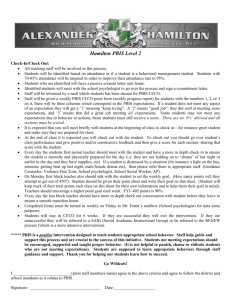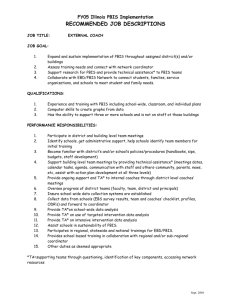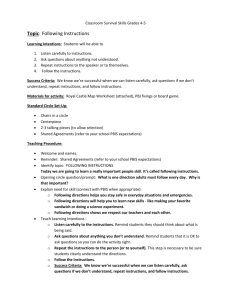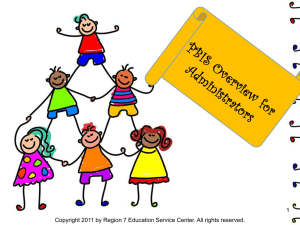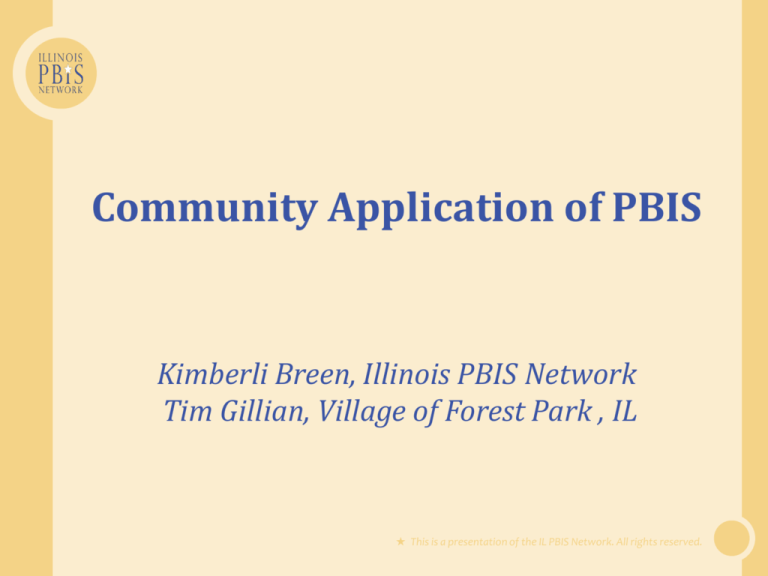
Community Application of PBIS
Kimberli Breen, Illinois PBIS Network
Tim Gillian, Village of Forest Park , IL
This is a presentation of the IL PBIS Network. All rights reserved.
Session Objectives
• Identify the critical features of
implementing PBIS in the community
• Describe one community's example of
implementation
in the school district, community center, public
library, park district and by police officers
community-wide
• Identify strategies for building collaborative
behavior support structures in communities
A little about Forest Park
District 91
• Urban Fringe district just west of the city of
Chicago
• 5 schools – 2 primary, 2 intermediate, 1
Middle School
• Very Diverse: 49% Black, 22.5% White,
12.5% Hispanic, 16% Other.
• 36% Low income
District-Wide
PBIS Implementation
• Started with Middle school to build
momentum since there was a negative
perception in the community about the Middle
School
• Beginning to include parents on PBIS teams in
the schools
• Communicate PBIS objectives and successes to
parents at all opportunities
• PBIS Objectives included in District Strategic
Plan
• Behavioral (SWIS) data reported to the board
twice a year
Community-wide
PBIS Implementation
• Initiated by a discussion of how best to use
prevention grant funds by the police department
Unique way to use grant funding…previously for ‘same ole’
programs…
Stopped just throwing out ideas…“youth center”, “basketball
with a cop”...needed structure/systems approach
• Goal is to have same expectations, strategies and
“common language” for youth throughout the
community
• Open dialogue between agencies centered around
positive solutions and intervention instead of
negative consequences
Community-wide Process
• Designated roles:
• External Community Coach
• Internal Coaches (police, library etc.)
• PBIS Administrators (Library Director etc.)
• Formed Community-Wide PBIS Leadership Team:
• PBIS Admin & Coaches from each site
• District Supt., Village Administrator, PBIS Network
• Trained teams from all settings (police, schools,
library etc.)
• Trained crossing guards, bus drivers, substitute
teachers, chamber of commerce
Community-wide PBIS Implementation
Whose involved?
Community-wide Leadership team:
• Village hall
• Police Department
• Park District
• Community Center
• Parents
• Library
• Schools/District
• Chamber of Commerce
Community-wide Process
• Monthly Community-wide Leadership Team
mtgs.
• Monthly Community-wide Coaches
meetings
• Annual assessment of implementation
• Family/Community Forum/s
• On-going training (new summer staff at
pool/park etc.)
• Picnic and other community events
posters
All-School Picnic
Raffling off bikes for good
behavior tickets
Checking for the winning tickets
PBIS in a
Public Library
Susan Kunkle
Youth Services Manager
Forest Park Public Library
Challenges at the
Unquiet Library
• Old school
expectations, new
school problems
• The truth about
consequences
• Adventures in unofficial
babysitting
Snapshot of a Library
(Before PBIS)
By the numbers
• Keeping track
• Suspensions
• Minor challenges
The service side
•
•
Growing pains
Anatomy of a suspension
Making it work:
Library implementation 101
•
•
•
•
•
Communicate!
Find common ground
Use your numbers
Involve your kids
Celebrate successes
Extreme Makeover
Library Edition
The Numbers Revisited
• Majors and Minors
• Trends
The Service Side
• Group Celebrations
• Quality AND quantity
• Unexpected payoffs
Forest Park Library
Facility-wide Evaluation Tool (FET)
% “In-Place” per FET Component 2011-12
SET Components
1) Expectations Defined
2) Expectations Taught
3) Rewards System
4) Violations System
5) Monitoring
6) Management
7) District Support
TS = Average % “InPlace” for LES or
“Total Score”
The Police Department & PBIS
The Police Department & PBIS
• Participate on the Community-wide PBIS
Leadership Team
• 2 officers are PBIS Internal Coaches
• Team of officers trained in Tier 1 & Tier 2
• Officers participate at All-School Picnic
• Officers make school presentations
• Community-wide, officers hand out
“gotchas” to youth for good behavior
All-School Picnic
PBIS Roll Call
• Police officers orientation and instruction
on using tickets
• http://www.pbis.org/swpbs_videos/pbs_v
ideo-creating_the_culture.aspx
Community Center Updates
• Less notices going home to parents regarding behavior.
• Staff are helping kids understand and demonstrate PBIS
expectations.
• Adults are using the “three B's” more often.
• More staff participation in using the “push-pins” vs. giving
time outs. Allows kids to participate in more fun activities
instead of sitting out.
• Less occurrences of bullying behavior/gossip than
previous years.
Next Steps
• Implement a “Check in Check Out” intervention.
• Continue to find better ways to track data.
“It’s in everyone’s best interest
that the schools are safe,
responsible & respectful.”
“Schools
are what make
a town.”
Timothy E. Gillian
Village Administrator
How to Get Started
• Identify a community-wide goal/need
• Use data
• Survey families/community
• Identify your stakeholders
• Who else cares about this goal?
• Who can help make an impact in this goal?
• What groups/settings support your students when
they’re not in school?
Make the News
• Caught doing good: PBIS goes community-wide
…PBIS …does is make sure those consequences
include rewards for good behavior as well as
punishments for behaving badly. ...
• Snapshot of the schools
"We want to take this district from good to great,“
• PBIS taps business
"Oh, sure. Recognizing kids for being good is really
going to work."
How to Get Started: Relationships
• Build on past collaborations, relationships
• Can be simple…start casual…make initial call!
• Don’t underestimate the School Board
• They influence their neighbors
• PTO: Can help get families come to other
events…must have ‘buzz’
• No rule that you can’t walk right into mayors
office…take direct approach
• Encourage Superintendent to get to know the
Mayor…2-way relationship (think…property values!)
How to Get Started: Leadership
Getting leaders to buy-in:
• Demand it/expect it
• Start where you’re most likely to get
leadership success..
• Identify and work towards mutual goals
Team without leaders can’t make decisions!
Forest Park leaders: Village Manager, Chief of Police, local Priest
Questions and Discussion



